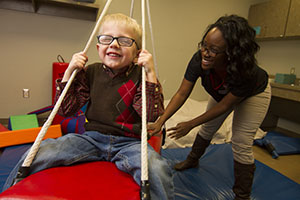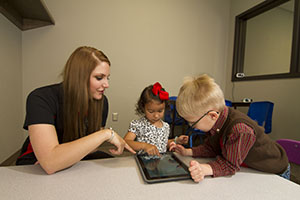School of Health Professions Hosts Summer Programs

The Texas Tech University Health Sciences Center (TTUHSC) School of Health Professions (formerly School of Allied Health Sciences) Speech, Language and Hearing Clinic hosted several summer programs to increase patients’ access to therapy and provide speech, language and hearing sciences and occupational therapy students the opportunity to hone skills learned in their programs.
The wide range of programs included the annual Matador Munchers program, which is focused on building positive food experiences for children ages three to six years with food selectivity. Clients were successfully encouraged to explore foods they would normally refuse due to sensory aversion, behavioral issues or oral motor deficits.
“We focus on clients with food selectivity because of its potential impact on a child's level of nutrition,” said Sarai Granados, M.S., CCC-SLP, Matador Munchers program coordinator, clinical instructor. “For instance, a child may have a diet restricted to ten foods or less due to food aversion. Their health may suffer for that, so we work to minimize those aversions via positive food experience for the clients combined with education for the family.”
For the student clinicians, the four-week session was a confidence-building opportunity to work with clients firsthand with the guidance of licensed veteran clinicians.
“Not all graduate speech-language pathology students have the opportunity to get training in pediatric feeding within a clinical setting,” Granados said. “Therefore, being involved in a pediatric feeding group like Matador Munchers is a unique experience for the students that get to participate.”
Additionally, the speech, language and hearing sciences students were paired with occupational therapy students and had the opportunity to learn the value of interprofessional collaboration.
“This year, we also had involvement from occupational therapy students, and they had an interprofessional experience collaborating together,” Granados said. “Within pediatric feeding, there is a lot of overlap in what the two fields do. If you were looking at the group working, you couldn’t tell which students were in occupational therapy and which were in speech-language pathology. They worked so well together.”
The combined skills of occupational therapy and speech-language pathology came together at Matador Munchers to create a positive environment in which to overcome pervasive food aversions. In addition to the skilled collaboration, the summer program also met more often and at a strategic time of day, which Granados said yielded better outcomes.
“It was great to run the program two times a week, as opposed to therapy just one time a week,” Granados said. “We also had the advantage of running the summer program sessions in the morning which seemed to have a positive impact on the client's level of response and possibly their level of progress. This summer, we had some kids overcome major feeding obstacles, and their parents were able to see them eat meat, fruit, or vegetables for the first time.”
Chelsea Cullins, speech-language pathology student, worked in the Tech Tykes program, which is supervised by Brittany Hall, M.S., CCC-SLP, LSLS Cert. AVT, clinical instructor, and focuses on building language skills in children ages three to six with speech delays. The summer programs offered the opportunity to get hands-on clinical experience.
“I hoped to gain a better understanding of clinic procedures before the fall semester started,” recalled Cullins. “I wanted to gain experiences interacting with an individual client with the opportunity to get direct feedback from supervisors. I was able to adjust to the entire procedure, including the therapy and the necessary paperwork.”
Since the summer program was Cullins’ first graduate clinical experience, she learned to overcome the unique obstacles that can occur in therapy each day.
“Each day presented new challenges, whether it was figuring out how to modify the
day’s activities for my specific client or how to engage them in each activity,” Cullins
said. “Tech Tykes improved my flexibility as a clinician, my ability to manage my
time between clients and my alertness.”

Students also participated in Raider Readers, which focuses on developing social skills and literacy in children in kindergarten through fifth grade. Carolyn Perry, M.S., CCC-SLP, Raider Readers coordinator, assistant professor, said the summer programs offer students the first opportunity to work in a clinical setting and the experience changes their perspective.
“You can see the students change the way they look at their clients and transform from a student to a clinician,” Perry said. “They recognize our job is to help clients participate in life with the greatest level of independence possible and reach their goals to communicate with family, friends and the community.”
Like with Matador Munchers, the intensity of Raider Readers sessions often leads to rapid progress. Perry says this is an exciting time of transformation, which reinforces to the students the significance of the work they are doing.
“One parent was worried at first, but on the last day, her eyes welled up with tears watching her child participate in the production beautifully,” Perry recalled. “Most of our students were a little misty-eyed as well. It actually does support the new initiative, ‘Your Life. Our Purpose.’”
Students recognized the rapid improvement in their skills and confidence, as well. Sara Eaton, a Speech-Language Pathology program student who assisted with the Stroke and Aphasia Recovery (STAR) Arts program, said getting one-on-one clinical coaching from faculty was a great help.
“It improved me because it took my biggest weaknesses and made me work on them all day, every day,” Eaton said. “I learned even more than I expected.”
The summer programs were made possible in part by the Kiwanis Club of Lubbock Chapter. For more information about future programs, visit ttuhsc.edu/shp.
Related Stories
Celebrating Veterans: TTUHSC’s General Martin Clay’s Legacy of Service and Leadership
From his initial enlistment in the Army National Guard 36 years ago to his leadership in military and civilian health care management roles, Major General Martin Clay’s career has been shaped by adaptability, mission focus and service to others.
Texas Tech University Health Sciences Center School of Nursing Named Best Accelerated Bachelor of Science in Nursing Program in Texas
The TTUHSC School of Nursing Accelerated Bachelor of Science in Nursing (BSN) program has been ranked the No. 1 accelerated nursing program in Texas by RegisteredNursing.org.
TTUHSC Names New Regional Dean for the School of Nursing
Louise Rice, DNP, RN, has been named regional dean of the TTUHSC School of Nursing on the Amarillo campus.
Recent Stories
The John Wayne Cancer Foundation Surgical Oncology Fellowship Program at Texas Tech University Health Sciences Center Announced
TTUHSC is collaborating with the John Wayne Cancer Foundation and has established the Big Cure Endowment, which supports the university’s efforts to reduce cancer incidence and increase survivability of people in rural and underserved areas.
TTUHSC Receives $1 Million Gift from Amarillo National Bank to Expand and Enhance Pediatric Care in the Panhandle
TTUHSC School of Medicine leaders accepted a $1 million philanthropic gift from Amarillo National Bank on Tuesday (Feb. 10), marking a transformational investment in pediatric care for the Texas Panhandle.
Texas Tech University Health Sciences Center Permian Basin Announces Pediatric Residency Program Gift
TTUHSC Permian Basin, along with the Permian Strategic Partnership and the Scharbauer Foundation, Feb. 5 announced a gift that will fund a new pediatric residency.
